![]()
Muhammad Ali Jinnah [1876-1948]
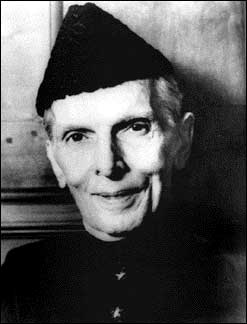
Pakistan, one of the biggest Muslim states, is a living monument of Quaid-i-Azam Muhammad Ali Jinnah. He, with his untiring efforts, indomitable will and dauntless courage united the Indian Muslims under the Muslim League banner and carved out a homeland for them despite stiff opposition from the Hindu Congress and the British government.
Muhammad Ali Jinnah was born at Karachi on December 25, 1876. His father, Jinnah Poonja, belonged to a prosperous business community, Isma'ili Khojas of Kathiawar. Muhammad Ali received his early education at the Sind Madrassa and later at the Mission School, Karachi. He went to England for further studies in 1892 at the age of 16. In 1896, Jinnah qualified for the Bar and in 1897 was called to the Bar.
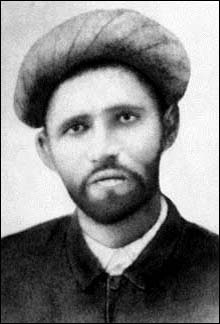
Jinnah Poonja, father of Quaid-i-Azam Muhammad Ali Jinnah
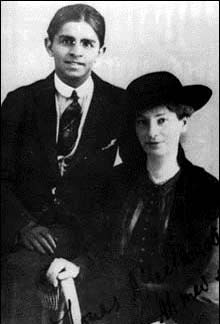
Quaid-i-Azam's brother Ahmed Ali with his wife Emy
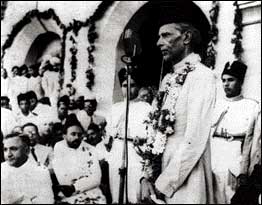
Jinnah continued his efforts for Hindu-Muslim unity till the publication of the Nehru Report
Muhammad Ali Jinnah started his political career in 1906, when he attended the Calcutta session of the All-India National Congress as the private secretary of the president of the Congress. Later in 1910, when he was elected to the Imperial Legislative Council, he sponsored the Waqf Validating Bill, which brought him in closer touch with the Muslim leaders. In March 1913, Jinnah joined the All-India Muslim League.
Once a member of the Muslim League, Jinnah began to work for Hindu-Muslim unity. In 1917, the annual sessions of both the Congress and the League were held at Lucknow. The League session, presided over by Muhammad Ali Jinnah, marked the culmination of his efforts towards Hindu-Muslim unity. A joint scheme of reforms was adopted both by the Muslim League and the Congress, known as the Lucknow Pact.
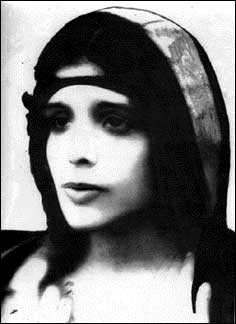
A portrait of Mrs. Ruttenbai Jinnah, wife of Jinnah
On April 19, 1918, Jinnah married Ruttenbai. Their only daughter Dina was born a year later. In 1919, Jinnah resigned his membership of the Imperial Legislative Council as a protest against the "Rowlatt Act".
Till the publication of Nehru Report, Jinnah continued his efforts for Hindu-Muslim unity. The Nehru Report, published in 1928, was severely criticized by all sections of Muslim opinion. In December 1928, when the National Convention, called to consider the Report, turned down the amendment moved by Jinnah, he finally parted ways with the Congress.
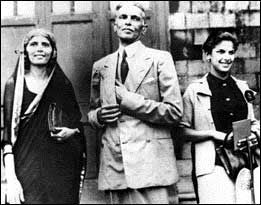
Quaid with his sister Fatima Jinnah (extreme left) and his only child Dina
In 1929, Jinnah gave his famous Fourteen Points. In 1934, he was elected as the permanent president of the Muslim League, which he reorganized on his return from England.
The 1937 provincial assemblies elections brought Congress to power in eight provinces. After almost two years of oppressive rule, Muslims under the leadership of Jinnah celebrated the Day of Deliverance at the end of Congress rule.
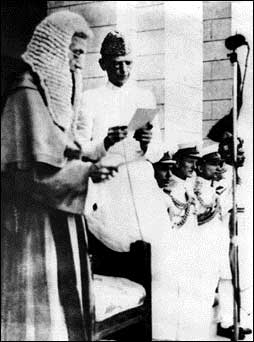
Quaid-i-Azam being administered the oath of office of the Governor General by the Chief Justice of Pakistan
Muslim League held its annual session at Lahore in March 1940, which was presided over by Quaid-i-Azam. Here the demand for Pakistan was formally put forward, which was realized on August 14, 1947, with Quaid-i-Azam Muhammad Ali Jinnah as its first Governor General.
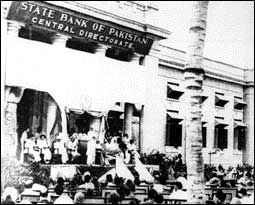
Quaid-i-Azam addressing the opening ceremony of the State Bank of Pakistan
The establishment of Pakistan brought great responsibilities for Jinnah. The refugee problem, the withholding of Pakistani assets by India, and the Kashmir problem were a real test for the Quaid. However, his indomitable will prevailed. He also worked out a sound economic policy, established an independent currency and a state bank for Pakistan. He selected Karachi as the federal capital.
However, he did not live long to witness the progress of the state which he had founded. On September 11, 1948, he died after a protracted illness at Karachi. He was buried in Karachi amidst the entire nation mourning over an unpayable loss.
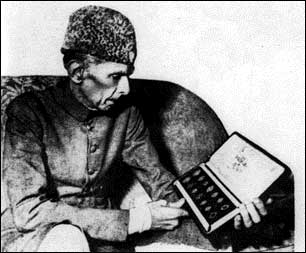
Quaid-i-Azam inspecting the new coins of Pakistan
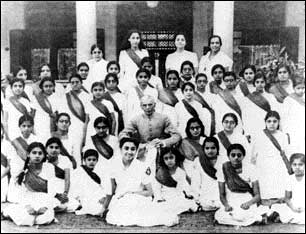
Quaid with a group of Women National Guards at Karachi, 1948